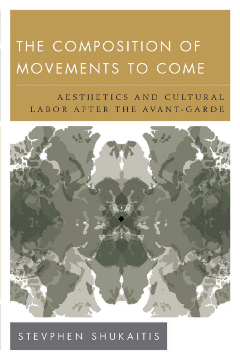
Additional Information
Book Details
Abstract
How does the avant-garde create spaces in everyday life that subvert regimes of economic and political control? How do art, aesthetics and activism inform one another? And how do strategic spaces of creativity become the basis for new forms of production and governance?
The Composition of Movements to Come reconsiders the history and the practices of the avant-garde, from the Situationists to the Art Strike, revolutionary Constructivism to Laibach and Neue Slowenische Kunst, through an autonomist Marxist framework. Moving the framework beyond an overly narrow class analysis, the book explores broader questions of the changing nature of cultural labor and forms of resistance around this labor. It examines a doubly articulated process of refusal: the refusal of separating art from daily life and the re-fusing of these antagonistic energies by capitalist production and governance. This relationship opens up a new terrain for strategic thought in relation to everyday politics, where the history of the avant-garde is no longer separated from broader questions of political economy or movement, but becomes a point around which to reorient these considerations.
Stevphen Shukaitis's new book makes a forcible and compelling contribution to a rejuvenated discussion on avant-garde art and politics. . . .This is much to appreciate in Shukaitis's book. . . .[It is] a strategic vision, and Shukaitis's Dada games and partisan misdirection make for a spirited experiment in pataphysical writing in the context of the real subsumption of labor.
I was convinced it was impossible to say something new about politics and the avant-garde, and I really enjoyed being proved wrong in so many different ways.
David Graeber, Professor of Anthropology, London School of Economics
Can strategy emerge from out of the diverse, fragmentary and temporary tactics of contemporary social movements? In this important book, which offers telling historical perspectives and is at the same time forged in the practice of political opposition, Stevphen Shukaitis offers a sustained argument that it can, and that it should.
Julian Stallabrass, Courtauld Institute of Art
Stevphen Shukaitis is Lecturer in Work & Organization (Assistant Professor) at the University of Essex and is a member of the Autonomedia editorial collective. He is the author of Imaginal Machines: Autonomy & Self-Organization in the Revolutions of Everyday Day (Autonomedia Press, 2009) and co-editor (with Erika Biddle and David Graeber) of Constituent Imagination: Militant Investigations // Collective Theorization (AK Press, 2007). He has written for numerous publications including Mute Magazine, Subjectivity, ephemera, Organization, Sociological Review, Journal of Communication Inquiry, Affinities, Journal of Aesthetics & Protest, Rethinking Marxism, and Culture Machine.
“Shukaitis's project is further distinguished by his emphasis on using avant-garde artistic practices as a means of mobilizing labor’s autonomy within deterritorialized capitalist spaces. [T]his is where the drift of his research moves into high gear.”
This is a really thought provoking book, and I would recommend it to anyone who wants to think about art in ways that are thoroughly social, and that try very hard indeed to rescue a radical politics from the global institutions of art capitalism.
Stevphen Shukaitis has produced an exposition on the strategic – as opposed to purely tactical – possibilities immanent within the post-war avant-garde that is as beautiful as the chance meeting of Autonomous Marxism and the Situationist International on the dissecting-table of critical theory.
Gregory Sholette, Assistant Professor of Sculpture and Social Practice at Queens College Art Department, The City University of New York
With The Composition of Movements to Come Stevphen Shukaitis does again what he has been doing as an author and editor for years: pushing the boundaries of intellectual and activist thought on the Left. By insisting that culture be understood strategically, rather than merely employed tactically, Shukaitis has unlocked the secret of an affective and effective artistic activism for our times. Brilliant and useful.
Stephen Duncombe, New York University; Co-Director, Center for Artistic Activism
